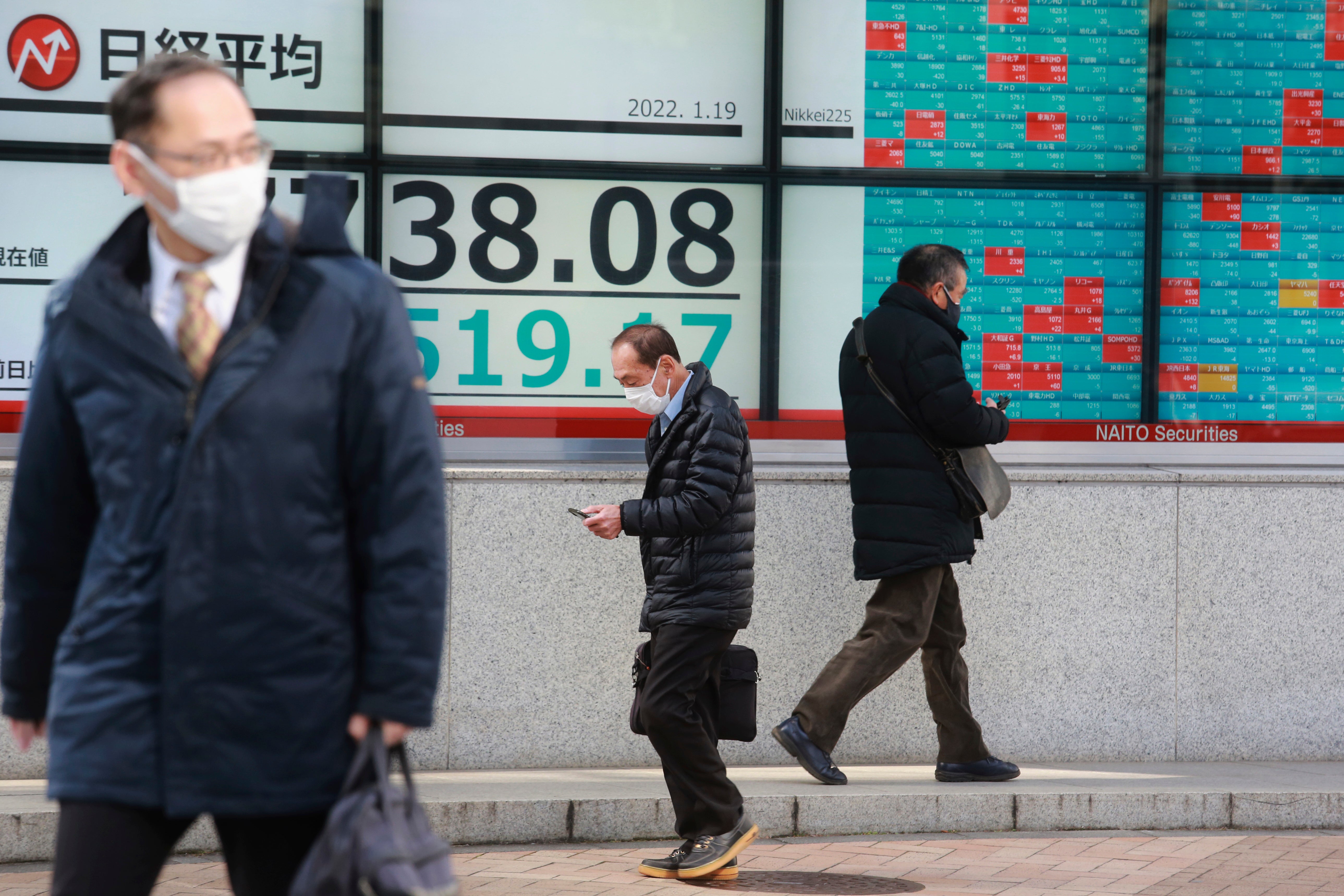Asian shares fall after retreat on Wall Street
Asian shares have fallen in cautious trading after stocks on Wall Street sank to a new low for the year

Your support helps us to tell the story
From reproductive rights to climate change to Big Tech, The Independent is on the ground when the story is developing. Whether it's investigating the financials of Elon Musk's pro-Trump PAC or producing our latest documentary, 'The A Word', which shines a light on the American women fighting for reproductive rights, we know how important it is to parse out the facts from the messaging.
At such a critical moment in US history, we need reporters on the ground. Your donation allows us to keep sending journalists to speak to both sides of the story.
The Independent is trusted by Americans across the entire political spectrum. And unlike many other quality news outlets, we choose not to lock Americans out of our reporting and analysis with paywalls. We believe quality journalism should be available to everyone, paid for by those who can afford it.
Your support makes all the difference.Asian shares fell in cautious trading on Wednesday. with Tokyo's Nikkei 225 down nearly 3%, after stocks on Wall Street sank to a new low for the year.
Shares also sank in Hong Kong, Shanghai, Seoul and Sydney.
Technology shares led the decline Tuesday on Wall Street. Increasing coronavirus infections in Asia, linked to the spread of omicron, are alarming policy makers. Asian economies have suffered during the pandemic and are struggling to get recoveries going again.
“The risk-off mood in global markets is being carried into Asia’s session today, as market expectations continue to price for a more aggressive Fed tightening ahead, with concerns that economic momentum may be capped,” said Yeap Jun Rong, market strategist at IG in Singapore.
Japan’s benchmark Nikkei 225 dropped 2.9% to 27,439.95, its lowest level since August, on heavy selling of big manufacturers like Toyota Motor Corp., which lost 5%, and Sony Corp., which plunged 12.8%, in line with other tech shares.
Australia’s S&P/ASX 200 fell 1.0% to 7,332.50. South Korea’s Kospi dropped 0.8% to 2,842.28. Hong Kong’s Hang Seng fell 0.2% to 24,064.48, while the Shanghai Composite lost 0.3% to 3,559.00.
On Wall Street, the major indexes’ losses have mounted this month as rising inflation and the pandemic’s latest surge cause investors to take caution.
Heightened expectations of a rate hike by the Federal Reserve have kept Treasury yields rising. The 10-year Treasury was steady at 1.87% on Wednesday, the highest since January 2020. It was at 1.77% late Friday.
Investors are now pricing in a better than 86% probability that the Fed will raise short-term rates at its meeting of policymakers in March. A month ago, they saw less than a 47% chance of that, according to CME Group.
The S&P 500 fell 1.8% to 4,577.11, with about 90% of the stocks in the benchmark index closing in the red.
The Nasdaq, which is heavily weighted with technology stocks, slid 2.6% to 14,506.90. The Dow Jones Industrial Average fell 1.5% to 35,368.47. Small company stocks, a gauge of confidence in economic growth, also lost ground. The Russell 2000 index fell 3.1%, to 2,096.23.
The Nasdaq has borne the brunt of the losses this month, shedding 7.3%. That puts the index within 2.7% of a correction, Wall Street-speak for when a stock or index falls 10% or more from its last peak. The S&P 500 is down almost 4% for the month after setting an all-time high on the first trading day of the year.
The 10-year yield “just continues to trudge higher, pricing in a more and more aggressive Federal Reserve,” said Ross Mayfield, investment strategy analyst at Baird. “Until over the weekend, I hadn’t seen any speculation about two rate hikes at the March meeting, and now you’re starting to hear that chatter."
The Fed is under pressure to curtail inflation, which jumped last month at its fastest pace in nearly 40 years. At the same time, the job market has bounced back, leaving the unemployment rate last month at a pandemic low of 3.9%. That gives the central bank more leeway to rein in the unprecedented support it's been providing the economy since the pandemic struck.
Higher rates could help stem inflation but would also mark an end to the conditions that have put markets in “easy mode” for many investors since early 2020.
Higher rates also make shares in high-flying tech companies and other expensive growth stocks less attractive. The sector was the biggest drag on the S&P Tuesday. Apple fell 1.9% and chipmaker Nvidia slid 3.9%.
Investors returning after U.S. markets were closed Monday for the Martin Luther King Jr. Day holiday also reviewed the latest batch of corporate earnings and deal news. Activision Blizzard surged 25.9% on news of a blockbuster deal. Microsoft, which fell 2.4%, is buying the maker of games like “Call of Duty” and ”Candy Crush” for $68.7 billion.
Bank of America, UnitedHealth and United Airlines report results on Wednesday. Earnings of American Airlines, Union Pacific and Netflix are due on Thursday.
In energy trading, benchmark U.S. crude added $1.10 to $86.53 a barrel in electronic trading on the New York Mercantile Exchange. Brent crude, the international standard, rose $1.00 to $88.51 a barrel.
In currency trading, the U.S. dollar fell to 114.30 Japanese yen from 114.61 yen. The euro inched up to $1.1329 from $1.1327.